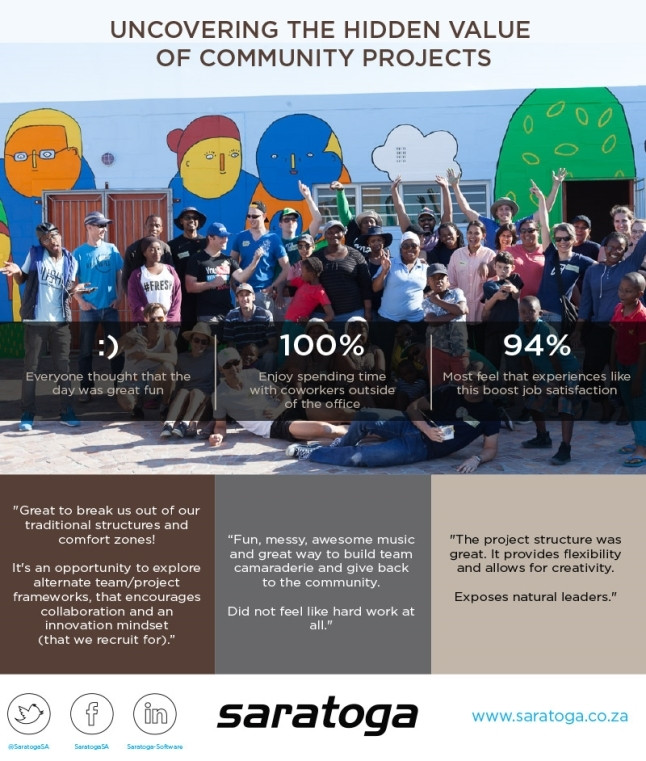It's commonly accepted that the majority of people want to work for companies who commit to social and community concerns (71% according to a 2000 Canada survey).
Since 2012, Saratoga has been involved with the Khayelitsha Christian Academy (KCA), a community run care centre for pre-schoolers.
Whether helping spring clean the property, building a jungle gym, supplying stationery or painting colourful murals, Saratoga employees have been eagerly involved with supporting the KCA. This is one way that Saratoga has tried to weave a social mindset into the company's fabric.
Khayelitsha Christian Academy community, SeeSawDo and team Saratoga channel their creative side, November 2015
Lived corporate values
An extensive University of Illinois/California study reveals that CSR provides employees with more than a deeper sense of purpose at work. Companies love to talk about their corporate values but many fall short of actually living them. Social good aside, community initiatives are a tangible way to "shape individual behaviour and expectations about how people work and interact together". They strengthen "feelings of belongingness" and are a social validation of company values. Furthermore they build on individual self-esteem stemming from a "positive social identity" (McKinsey).
The benefits of working collaboratively
At a recent event, painting SeeSawDo's designs onto the KCA school walls, it was very clear that a different type of team planning and project execution was taking place. After some observation and research, Saratoga conducted an anonymous poll to feel out how activities like this made staff feel about their work life. The results were unanimous. 94% felt that experiences like this boost job satisfaction.
* Survey of Saratoga staff, November 2015
Leadership was organic rather than by authority - the painting project leveled the playing field. Mark Gebhardt, Saratoga's CEO, noted the different styles of working: "Some folks owned a section of wall and focused on that; others chose a colour and worked across the walls; others filled gaps and supported the painters by passing brushes, paint and words of encouragement". Individuals focused on their strengths and let the others do the rest. A great moment was watching a Saratoga learner gently easing aside a senior manager to take over a more detailed design. Being able to connect and collaborate with team members in a company where staff are often placed at clients, meant it was a great way to interact with colleagues too.
A little Googling into the internal effects of similar community-based projects from global polls confirms what Saratoga observed: most people place a lot of value on the enjoyment of working in unstructured teams. Natural leaders tend to shine through regardless of their position back in the office, and people are able to work in a fashion that suits them best.
Saratoga has proven that social responsibility projects have a positive impact on the employees as well as the community. They encourage others to take on CSR projects, to integrate them into how the company operates, learns and grows.
Experts in digital strategy and delivery, Saratoga is a company driven by passion for business and technology. Because it's part of our DNA. To enquire about positions or for more information please visit www.saratoga.co.za or contact it on 021 658 4100.

For more articles published by Saratoga please see its Press Office http://www.itweb.co.za/office/saratoga/
References:
Bauman, C. & Skitka, L. 2012. ScienceDirect. Corporate social responsibility as a source of employee satisfaction.
Blake, R. 2006. WebProNews. Employee Retention: What Employee Turnover Really Costs Your Company.
Hensley, L. 2014. Entrepreneur. Corporate social responsibility done right.
Keys, T. 2009. McKinsey & Company. Making the most of corporate social responsibility.
https://www.ic.gc.ca/eic/site/csr-rse.nsf/eng/rs00555.html
Share
Editorial contacts